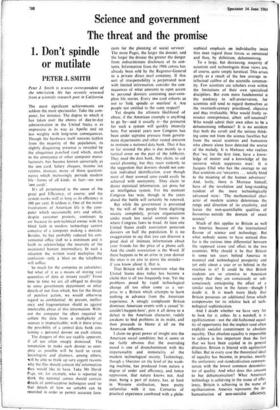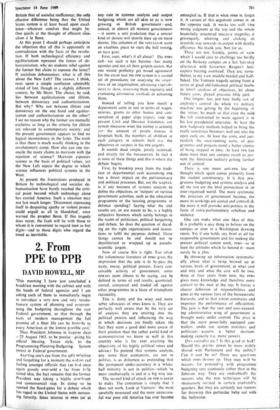1. Don't spindle or mutilate Science and government The threat
and the promise
PETER J. SMITH
Peter Smith is science correspondent of
the SPECTATOR. He has recently returned from a scientific research post in California.
The most significant achievements are seldom the most spectacular. Take the com- puter, for instance. The degree to which it has taken over the chores of day-to-day administration in the United States is as impressive in its way as Apollo and no less weighty with long-term consequences. Though the hardware itself remains hidden from the majority of the population, its slightly disquieting presence is revealed by the ubiquitous punched card which, much
to the annoyance of other computer manu- facturers, has become known universally as the IBM card. Salary cheques, income tax returns, invoices, many of those question- naires which increasingly pervade modern life—forms of all kinds. in fact—are now 'IBM cards'.
It's all perpetuated in the cause of the great god Efficiency, of course; and the system works well as long as its efficiency is 100 per cent. It seldom is. One of the minor frustrations of American life is the com- puter which occasionally errs and which, despite customer protests, continues to err because its non-technical owner with his blind faith in modern technology cannot conceive of a computer making a mistake. Besides, he has probably reduced his con- ventional office staff to a minimum and is loath to acknowledge the necessity of the occasional human intermediary. In such a situation the written word multiplies the confusion—only a blast on the teleprtone will suffice.
So much for the computer as calculator; but what of it as a means of storing vast quantities of data at instant recall? From time to time we are all obliged to divulge to some government department or other details of our lives which, but for the threat of punitive action, we would otherwise regard as confidential. At present, ineffici- ency and fragmentation shield us against intolerable abuse of this information. With- out the computer the effort required to collate the data from a multiplicity of sources is impracticable; with it there arises the possibility of a central data bank con- taining a personal dossier on each citizen.
The dangers of this are readily apparent, if all too often smugly dismissed. The temptation to make each dossier as com- plete as possible will be hard to resist. Sociologists and planners, among others, will be able to think up very cogent reasons why the files should contain the information they would like to have. Take Mr Derek Page, MP, for example, who is reported to think the national census should contain details of contraceptive techniques used 'so that details of how we cohabit can be recorded in order to permit accurate fore-
casts for the planning of social services' The more Pages, the larger the dossier; and the larger the dossier the greater the danger from indiscriminate disclosure of its con- tents. Information from the 1966 census has already been sold by the Registrar-General
to a private direct mail company. If this sort of irresponsibility is perpetrated now with limited information, consider the con- sequences of what amounts to open access to personal dossiers containing near-com- plete life stories. Every IBM card exhorts us not to 'fold, spindle or mutilate' it. Are people not entitled to the same respect?
Yet despite the ultimate likelihood of abuse, if the American example is anything to go by—and it usually is—the pressures for such a system will quickly intensify here. For several years now Congress has been under supreme pressure from govern- ment departments and other vested interests to institute a national data bank. That it has so far resisted the plea is due mainly to a tactical error on the part of the lobbyists. They need the data bank, they claim, to aid social planning; but they react violently to the suggestion that dossiers should not con- tain individual identification, even though most of their avowed aims could easily be achieved with anonymity. They claim to desire statistical information, yet press for an intelligence system. For the moment
Congress has won, though in the years ahead the battle will certainly be renewed. But while the government is prevented by the will of the people from digitising
society completely, private organisations under much less social control move in where Congress fears to tread. At least one United States credit association possesses dossiers on half the population. It is no exaggeration to say that you can discover a great deal of intimate information about your friends for the price of a phone call. And the credit association is the Word. If there happens to be an error in your dossier the onus is on you to prove the mistake— if you know about it, that is.
That Britain will do tomorrow what the United States does today has become a cliché that is all too frequently true. Yet the problems posed by rapid technological change all too often come as a sur- prise to a Britain which attempts to learn nothing in advance from the American experience. A smugly complacent Britain dismisses American events with a casual 'it- couldn't-happen-here', puts it all down to a defect in the American character, rudely awakens to find problems in its midst, and then proceeds to blame it all on the American influence.
I claim no great power of insight into the American social condition; but it seems to me fairly obvious that the overriding mood is one of disenchantment with the impersonality and immorality of the modern technological society. Technology, though a liberator on the level of the wash- ing machine, has produced from nature a degree of order and efficiency, and hence oppression, that nature knows not. And man, being a part of nature, has, at least in Western civilisation, been pretty unfamiliar with it too. Centuries of practical experience combined with a philo-
sophical emphasis on individuality insist that man regard these forces as unnatural and thus, by definition, dehumanising.
To a large, but decreasing, majority of scientists and technologists these views are, of course, quite simply heretical. This arises partly as a result of the low average in- tellectual calibre of the scientific commun-
ity. Few scientists are scholars even within
the limitations of their own specialised disciplines. But even more fundamental is
the tendency to self-preservation, for scientists still tend to regard themselves as the twentieth-century priesthood, objective and thus irrefutable. Who would freely re- nounce omnipotence, albeit self-assumed? Who would admit their own ethos to be a dehumanising influence? It is no accident that both the revolt and the serious think- ing come not from the science faculties but from the social scientists and humanists who almost alone have detected the source of the malady. It is Malraux who realises that 'we, for the first time, have a know- ledge of matter and a knowledge of the 'universe which suppresses man'. It is Jacques Ellul who has the courage to say that scientists are 'sorcerers . . . totally blind to the meaning of the human adventure'. And, lastly, there is Marcuse himself, hero of the revolution and long-standing resident of the most technologically advanced state: 'The mathematical char- acter of modern science determines the range and direction of its creativity, and leaves the non-quantifiable qualities of humanitas outside the domain of exact science.'
Much of this applies to Britain as well as America because of the international flavour of science and technology. But what nobody seems to have noticed thus far is the curious time differential between the supposed cause and effect in the two countries. Why should it be that Britain is some ten years behind America in material and technological prosperity and yet only about a year or so behind in the reaction to it? It could be that British students are so attentive to American society that they are consciously or sub- consciously anticipating the effect of a similar state here in the future—though I doubt it. It is much more likely that Britain possesses an additional force which compensates for its relative lack of tech- nological sophistication.
And I doubt whether we have very far to look for it, either. In a nutshell, it is egalitarianism--not the old-fashioned equal- ity of opportunity but the implicit (and often explicit) socialist commitment to absolute equality. That absolute equality is impossible to achieve is less important than the fact that we have been cajoled in its general direction. Britain is littered with egalitarian follies. But in every case the theoretical ideal of equality has become, in practice, merely the uniformity and standardisation commen- surate with the lowest common denomina- tor of quality. And what does this amount to but dehumanisation? What American technology is achieving in the name of effic- iency, Britain is achieving in the name of egalitarianism. America represents the de- humanisation of non-socialist efficiency,
Britain that of socialist inefficiency; the only effective difference being that the United States system is at least based upon excel- lence—whatever comfort that might be. One quails at the thought of efficient soap, alism Li /a Benn.
At this point I should perhaps anticipate the objection that all this is apparently in contradiction with the facts of the revolu- tion. If both technological efficiency and egalitarianism represent the forces of de- humanisation, why do students rebel against the former but claim to espouse the latter? If socialism dehumanises, what is all this about the New Left? The answer, I think, rests upon a simple confusion admirably stated of late, though in a slightly different context, by Mr Short. The choice, he said, lies between egalitarianism and elitism, between democracy and authoritarianism. But why? Why not between elitism and democracy on the one hand and egalitar- ianism and authoritarianism on the other? I see no reason why the former are mutually exclusive as long as the criteria for elitism are relevant to contemporary society; and the present government appears to find no logical inconsistency in the latter. The truth is that there is much woolly thinking in the revolutionary camp. How else can one rec- oncile the many claims to marxism with gin rejection of science? Marxism espouses science as the basis of political values, yet the New Left rejects the degree to which science influences political systems in the West.
At present the frustrations produced in Britain by technological and socialist de- humanisation have barely reached the criti- cal point beyond which technology alone has carried America. Such a situation may not last much longer. `Discontent expressing itself in despairing apathy or violent protest could engulf us all in bloodshed', once warned the prophet Benn. If this tragedy does occur, the fault will lie with those to whom it is convenient to regard men as but digits—and to those digits who regard the trend as inevitable.



































 Previous page
Previous page